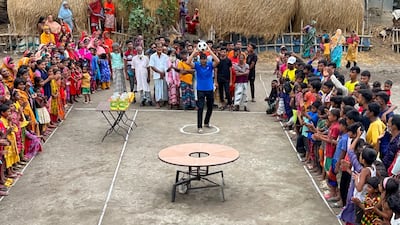On a sunny day in Bangladesh, a queue of men and women watch attentively as people take turns playing a game. The aim is simple – throw a red ring on to a red bottle fixed to a table – but this is far from easy, with six other bottles on the spinning surface.
The winner gets a five-litre jar of groundnut oil. The game is tough, the pressure palpable.
One after the other, participants fail, until a woman succeeds and proudly walks off with the prize to loud applause.
These fascinating, innovative games have become popular in Bangladesh, particularly among villagers and those from poorer backgrounds.
The SS Food Challenge is the brainchild of Omar Sunny Somrat, whose team of 20 record the games for social media.
The footage is watched by millions and has a combined subscriber base of three million followers on Facebook and YouTube – including more than 500,000 followers from the UAE – and more than a billion combined views for its video content.
At a time when games played on smartphones have become the norm, Mr Somrat and his team are bringing communities closer by organising innovative physical games.
“Smartphone is a popular medium of entertainment but these games are entertaining and the purpose of these challenges is to build community harmony,” Mr Somrat told The National. "People get together and win prizes that are daily essential items.
“We want to bring exciting, entertaining games to all the villages. It is not charity. We are trying to help people while also entertaining them.”
Among the many quirky games are scoring a goal with a football while sitting on a chair, rolling tyres to break bottle towers and balancing ping-pong balls on a shaky, hanging platform.
Contenders are selected on a first-come-first-served basis.
“Our viewers will get bored if we repeat the same games, so we have to always try to innovate,” Mr Somrat said. "We have a dedicated team that brainstorms ideas and improvises or modifies games.
“The games are extremely popular and everyone wants to play but it would be difficult to control the crowd as at any given day over 300 people gather. We let 20-50 people play.”

Entertainment with a cause
The unique concept has made the SS Food Challenge immensely popular both offline and online.
Mr Somrat, a former administrative officer with Australia Bangladesh Chamber of Commerce and Industry in Dhaka, said he had always been drawn to video content creation and started a YouTube channel in 2016, mainly featuring funny videos.
A year later, he started a singing talent competition where he travelled across Bangladesh looking for singers. In 2019, he was struck by a different idea.
“One day when I went to a village, I noticed that in the evening the daily wage labourers or those who work at brick kilns were gathered at one place. They were bored and tired. I thought of starting a food-eating challenge for them.
“We started with a challenge for who can eat the maximum number of sweets. That video became instantly popular. But I was scared that fast eating is not safe. Even if the quality of the food is good, one can get sick if they eat too fast.”

A year later, as the coronavirus pandemic gripped the nation, Mr Somrat was inspired to create a new challenge after seeing children and adults spending long hours on their phones.
“That’s when I got the idea to organise these games for children but they were not coming to just play games. We started offering prizes such as chocolates or toys.”
Adults started showing interest in these games, too. The first challenge with prizes took place in December 2021 in Faridpur in Pabna district in central Bangladesh.
The video became popular overnight drawing hundreds of thousands of views.
The channel’s popularity boomed in January 2022 when prices of daily essentials suddenly rose due to inflation.
“That’s when we thought of giving soybean oil or rice as prizes that can be of use.”
Mr Somrat doesn’t take any sponsored products and says he bears all the expenses.
“We decided to give a consolation prize to all the participants because they are also investing their time for our videos. It is only fair to thank them.
“Our YouTube and Facebook are monetised. We don’t take sponsors because we would be tied by their terms and conditions. We have been offered energy drinks but I don’t want that because our aim is to help them with essential items.”
So far, they have covered more than 40 villages in Pabna district but their aim is to organise such games across Bangladesh.
"We want to entertain people while also doing a noble cause," Mr Somrat said.


